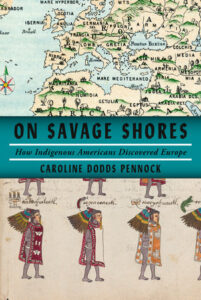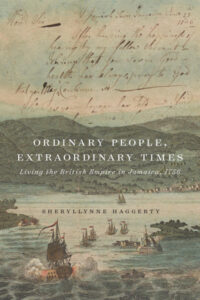New York: Alfred A. Knopf | $32.50 | Published 2023 | 302 Pages | ISBN: 9781524749262
 From the Press “A landmark work of narrative history that shatters our previous Eurocentric understanding of the Age of Discovery by telling the story of the Indigenous Americans who journeyed across the Atlantic to Europe after 1492. We have long been taught to presume that modern global history began when the “Old World” encountered the “New”, when Christopher Columbus “discovered” America in 1492. But, as Caroline Dodds Pennock conclusively shows in this groundbreaking book, for tens of thousands of Aztecs, Maya, Totonacs, Inuit, and others–enslaved people, diplomats, explorers, servants, traders–the reverse was true: they discovered Europe.
From the Press “A landmark work of narrative history that shatters our previous Eurocentric understanding of the Age of Discovery by telling the story of the Indigenous Americans who journeyed across the Atlantic to Europe after 1492. We have long been taught to presume that modern global history began when the “Old World” encountered the “New”, when Christopher Columbus “discovered” America in 1492. But, as Caroline Dodds Pennock conclusively shows in this groundbreaking book, for tens of thousands of Aztecs, Maya, Totonacs, Inuit, and others–enslaved people, diplomats, explorers, servants, traders–the reverse was true: they discovered Europe.
For them, Europe comprised savage shores, a land of riches and marvels, yet perplexing for its brutal disparities of wealth and quality of life, and its baffling beliefs. The story of these Indigenous Americans abroad is a story of abduction, loss, cultural appropriation, and, as they saw it, of apocalypse–a story that has largely been absent from our collective imagination of the times. From the Brazilian king who met Henry VIII to the Aztecs who mocked up human sacrifice at the court of Charles V; from the Inuk baby who was put on show in a London pub to the mestizo children of Spaniards who returned “home” with their fathers; from the Inuit who harpooned ducks on the Avon river to the many servants employed by Europeans of every rank: here are a people who were rendered exotic, demeaned, and marginalized, but whose worldviews and cultures had a profound impact on European civilization.
Drawing on their surviving literature and poetry and subtly layering European eyewitness accounts against the grain, Pennock gives us a sweeping account of the Indigenous American presence in, and impact on, early modern Europe.”
 From the publisher: “Examining the transatlantic writings and professional careers of Thomas Carlyle and Ralph Waldo Emerson, this book explores the impact of literary, cultural, political and legal manifestations of authority on nineteenth-century British and American writing, publishing and lecturing. Drawing on primary texts in conjunction with a rich body of archival sources, this study retraces Romantic debates about race and nationhood, analyses the relationship between cultural nationalism and literary historiography and sheds light on Carlyle’s and Emerson’s professional identities as publishing authors and lecturing celebrities on both sides of the Atlantic.”
From the publisher: “Examining the transatlantic writings and professional careers of Thomas Carlyle and Ralph Waldo Emerson, this book explores the impact of literary, cultural, political and legal manifestations of authority on nineteenth-century British and American writing, publishing and lecturing. Drawing on primary texts in conjunction with a rich body of archival sources, this study retraces Romantic debates about race and nationhood, analyses the relationship between cultural nationalism and literary historiography and sheds light on Carlyle’s and Emerson’s professional identities as publishing authors and lecturing celebrities on both sides of the Atlantic.”
